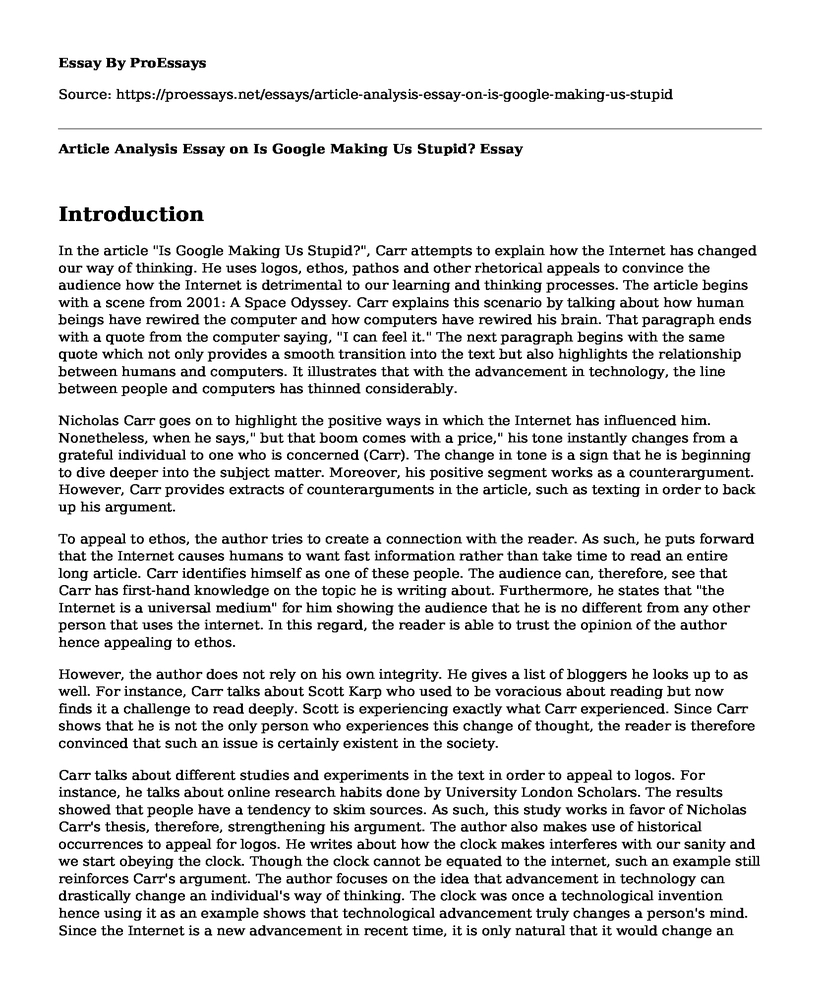Introduction
In the article "Is Google Making Us Stupid?", Carr attempts to explain how the Internet has changed our way of thinking. He uses logos, ethos, pathos and other rhetorical appeals to convince the audience how the Internet is detrimental to our learning and thinking processes. The article begins with a scene from 2001: A Space Odyssey. Carr explains this scenario by talking about how human beings have rewired the computer and how computers have rewired his brain. That paragraph ends with a quote from the computer saying, "I can feel it." The next paragraph begins with the same quote which not only provides a smooth transition into the text but also highlights the relationship between humans and computers. It illustrates that with the advancement in technology, the line between people and computers has thinned considerably.
Nicholas Carr goes on to highlight the positive ways in which the Internet has influenced him. Nonetheless, when he says," but that boom comes with a price," his tone instantly changes from a grateful individual to one who is concerned (Carr). The change in tone is a sign that he is beginning to dive deeper into the subject matter. Moreover, his positive segment works as a counterargument. However, Carr provides extracts of counterarguments in the article, such as texting in order to back up his argument.
To appeal to ethos, the author tries to create a connection with the reader. As such, he puts forward that the Internet causes humans to want fast information rather than take time to read an entire long article. Carr identifies himself as one of these people. The audience can, therefore, see that Carr has first-hand knowledge on the topic he is writing about. Furthermore, he states that "the Internet is a universal medium" for him showing the audience that he is no different from any other person that uses the internet. In this regard, the reader is able to trust the opinion of the author hence appealing to ethos.
However, the author does not rely on his own integrity. He gives a list of bloggers he looks up to as well. For instance, Carr talks about Scott Karp who used to be voracious about reading but now finds it a challenge to read deeply. Scott is experiencing exactly what Carr experienced. Since Carr shows that he is not the only person who experiences this change of thought, the reader is therefore convinced that such an issue is certainly existent in the society.
Carr talks about different studies and experiments in the text in order to appeal to logos. For instance, he talks about online research habits done by University London Scholars. The results showed that people have a tendency to skim sources. As such, this study works in favor of Nicholas Carr's thesis, therefore, strengthening his argument. The author also makes use of historical occurrences to appeal for logos. He writes about how the clock makes interferes with our sanity and we start obeying the clock. Though the clock cannot be equated to the internet, such an example still reinforces Carr's argument. The author focuses on the idea that advancement in technology can drastically change an individual's way of thinking. The clock was once a technological invention hence using it as an example shows that technological advancement truly changes a person's mind. Since the Internet is a new advancement in recent time, it is only natural that it would change an individual's thinking as well.
The main form of pathos used in the text is by inducing fear into the mind of the audience. This is evident in where Carr talks about how Google tries to attach artificial intelligence in human minds. He terms this occurrence as unsettling thus instilling fear into the reader. Carr goes ahead and describes the human brain as an old-fashioned computer that needs a fast processor. By comparing the human brain to a machine, the audience is shown that computers have taken over our thought processes. The thought of computers replacing humans is terrifying hence appealing to pathos. Furthermore, by referring to the brain as outdated, Carr gives the impression that the human brain is inferior to the computer processor.
Similar to how the author uses ancient references to appeal to logos, some references work in counterarguments. The printing press is an example where human thinking has changed. Carr notes that what people would lose because of the internet is much more valuable than what is lost from the printing press. Such a retraction is a key appeal to logos. Carr finally turns to use fear as an appeal of pathos stating that the internet can transform humanity into what he terms as "pancake individuals."
Conclusion
Overall, Nicholas Carr heavily employs the use of ethos, pathos, and logos in the article. Primarily, his ethos is focused on connecting with his audience as fellow human beings. His logos principally comprise of quoting experiments and referencing ancient inventions. His pathos, on the other hand, is created by instilling fear into the audience by expressing the likely outcome of overusing the Internet.
Works Cited
Carr, Nicholas. Is Google Making Us Stupid? 2008. https://www.theatlantic.com/magazine/archive/2008/07/is-google-making-us-stupid/306868/.
Cite this page
Article Analysis Essay on Is Google Making Us Stupid?. (2022, Nov 26). Retrieved from https://proessays.net/essays/article-analysis-essay-on-is-google-making-us-stupid
If you are the original author of this essay and no longer wish to have it published on the ProEssays website, please click below to request its removal:
- Backups Security Issue Essay Example
- Essay Example on Virtual Museum: Enhancing Museum Experiences Through Digital Interaction
- Research Paper on The Cyborg Life: Big Data and Human Cooperation
- Essay Example on Data Center Location: Finding the Ideal Spot
- Essay Example on Veronica Wang: A YouTube Food Channel with a Huge Following
- Paper Sample on Technology: Key to Organizational Success Through Information Systems
- Paper Sample on Vulnerability Assessment: Identifying Network Security Weaknesses







